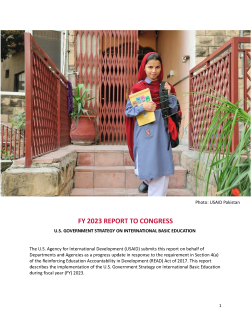This report highlights results from the U.S. government’s international basic education programs for fiscal year 2023. In addition, it is the final report for the 2018–2023 Strategy on International Basic Education. Two years into implementation of this Strategy, the COVID-19 pandemic caused the largest disruption to education and learning in modern history, exacerbating the pre-pandemic learning crises. Education systems faced extraordinary headwinds as countries worked to address learning loss with limited resources and continued disruptions from conflict, crises, and natural disasters.
Despite challenges from the COVID-19 pandemic and ongoing conflicts and crises disrupting education, U.S. government programs increased the number of learners who attain minimum proficiency in reading in 15 countries during and after the pandemic emergency. Programs implemented over the course of the 2019–2023 U.S. Government Strategy on International Basic Education reached more than 34 million learners annually. In total over the five years, U.S. government programs trained 2.9 million teachers and educators, supplied 176 million textbooks and other teaching and learning materials, and worked to strengthen systems, including by adopting 525 new or reformed laws and policies. In addition, the U.S. government provided an average of 3.4 million children and youth with school meal services annually, recognizing that children must be healthy when they enter school, so they are ready to learn.
Through the U.S. Government Strategy on International Basic Education 2024–2029, the U.S. government will continue building on these efforts and partner with countries and stakeholders to increase capacity and strengthen education systems to be more inclusive and responsive to the needs of all learners and educators, particularly girls and other historically marginalized groups. This includes strengthening cross-sectoral coordination to reduce barriers to education and increase learning outcomes. Each agency and department involved in international basic education brings distinct resources, expertise, capabilities, and experience to address global challenges. The collective results of the U.S. government’s efforts will further learning for students and improve their quality of life more broadly by supporting economic growth, improving health outcomes, reducing violence, and increasing participation in democratic governance.

